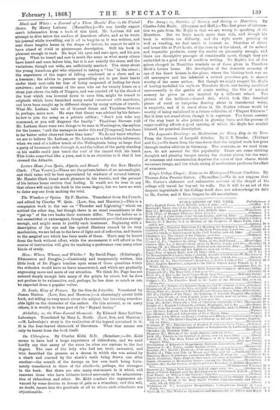Black and White : a Journal of a Three Months'
Tour in the United States. By Henry Latham. (Macmillan.)—We can hardly expect much information from a book of this kind. Mr. Latham did not attempt to dive below the surface of American affairs, and as he wrote his journal while travelling, cut it off in lengths as it was written, and sent these lengths home in the shape of letters, he cannot be said to have aimed at vivid or picturesque description. Still his book is pleasant enough to read. He kept his eyes and ears open, and his pen going. What he heard and saw is much the same as what many others have heard and seen before him, but it is not exactly the same, and the variations, though not wide, are sufficiently marked. The story about the young American girl who objected to taking a " bus " in the street ; the experience of the negro of falling overboard as a slave and as a freeman ; the advice to persons quarrelling not to put their hands under their coat-tails for fear of being suspected of feeling for their revolvers ; and the account of the man who sat for twenty hours on a stone just above the falls of Niagara, and was carried off by the shock of the boat which was lowered down to save him, might be traced to originals which have furnished many social raconteurs with anecdotes, and have been caught up in different shapes by many writers of travels. What Mr. Latham tells us of General Grant and Thaddeus Stevens is, perhaps, more new. He says that Grant was advised by his father- in-law to join the army as a private soldier ; "Don't you take any command, or you will disgrace the family." Thaddeus Stevens told Mr. Latham there were two things to be seen in Washington, the asylum for the insane, " and the menagerie under this roof [Congress], but there is far better order observed there than here." We do not know whether we are to believe Mr. Latham, or Mr. Latham is to believe his informant, when we read of a hollow trunk of the Wellingtonia being so large that a party of horsemen rode through it, and the tallest of the party standing on his saddle could just touch the roof of the tunnel with his hand. This looks somewhat like a yarn, and it is no objection to it that it has crossed the Atlantic.


































 Previous page
Previous page